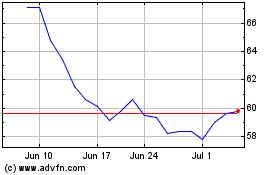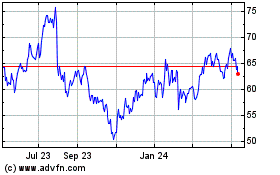Companies Give Employees a Bigger Say in Corporate Philanthropy -- Journal Report
March 24 2019 - 10:31PM
Dow Jones News
By Lisa Ward
Should employers give their employees a bigger say in the
company's charitable giving?
Many philanthropy experts say they should and corporations are
taking heed, shifting more of their philanthropic dollars to
matching-gift and paid-volunteer programs, and encouraging
employees to sit on grant-making committees and vote on specific
initiatives.
The move reflects a change in thinking about corporate
philanthropy, which increasingly is being seen as a way to recruit
and retain employees. Amid the shift, nonprofit organizations such
as United Way Worldwide are changing how they work with companies,
so that employees have a bigger role in corporate-giving
campaigns.
"Employees want to express their personal values at work," says
Katherine Smith, executive director of the Boston College Center
for Corporate Citizenship at the Carroll School of Management. This
is a break from the past, when executives and managers often
dictated workplace-giving campaigns.
U.S. companies gave about $20.7 billion to charitable causes
world-wide in 2017, up 8% from 2016, according to an annual report
written by researchers at Indiana University Lilly Family School of
Philanthropy and funded and published by the Giving Institute. That
represents about 5% of all U.S. charitable giving, which totaled
$410 billion in 2017, the report said.
Successful workplace-giving campaigns have been linked to
improved productivity, employee satisfaction and better recruiting
success, says Una Osili, associate dean and professor at the Lilly
Family School of Philanthropy. Recent research also shows that
employees today are more likely to participate in workplace-giving
campaigns if they have a say in where the money is going, she
says.
New technology is making it easier for employees to get
involved. Many firms use electronic platforms that allow employees
to make charitable gifts through payroll deduction. Firms also use
the platforms to match employee gifts, track volunteer hours (many
companies pay employees to volunteer or give them paid time off to
volunteer) and promote and elicit feedback about new giving
campaigns.
PayPal Holdings Inc. gave more than $11 million to charitable
causes in 2017. It says employees directed almost $3 million of
those donations through matching gifts and a program that allows
PayPal employees to nominate nonprofits they think are deserving of
company grants. Employee-review committees narrow down the
proposals to a group of finalists, and employees are then given the
opportunity to vote to determine the winner. Grants range from
$1,500 to $10,000, though review committees can also recommend a
larger grant of between $20,000 and $50,000 from the company's
innovation fund.
"Through these grants, we've partnered with local organizations
that we may not have come across otherwise," says Sean Milliken,
head of global social innovation at PayPal. He points to a Parisian
charity that makes an app designed to help refugees find essential
services such as food and housing as an example of one such grant
recipient.
A common way to get employees involved in philanthropy is
through matching-gift programs, where the company offers to match
employee donations to eligible nonprofits. A survey of 200 Fortune
1,000 companies found that 80% offered a workplace giving program.
Of those companies more than 70% offered a match for monetary
donations and 43% offered a cash match for volunteer hours,
according to a coming study from the Boston College Center for
Corporate Citizenship.
"Matching contributions now account for about 10% of all
corporate donations," says Carmen Perez, senior director of data
insights at Chief Executives for Corporate Purpose, a coalition of
large companies.
Salesforce.org, the philanthropic arm of cloud-computing company
Salesforce.com Inc., says about 30% of its grants budget goes
toward matching employees' donations. After Hurricane Maria, a
former SalesForce.com employee wanted to raise $1 million for the
storm's survivors in Puerto Rico. She used the company's internal
communication platform to fundraise, and within two months,
employees had donated $250,000 to the cause. Salesforce matched
that and gave another $250,000. Salesforce.com founder Marc Benioff
and his wife, Lynne, donated the remaining $250,000. As part of the
fundraising drive, Salesforce employees also volunteered in Puerto
Rico, repairing roofs and rebuilding.
In February 2018, Salesforce.org and United Way joined forces to
launch Philanthropy Cloud, a workplace-giving platform that allows
employees to direct contributions to charities. United Way says the
move reflects a transformation from its previous operating model,
where corporations and employees often donated money to United Way
during an annual campaign, and United Way funded the charities.
"Employees want to be empowered," says Rob Acker, the chief
executive officer of Salesforce.org.
Ms. Ward is a writer in Mendham, N.J. She can be reached at
reports@wsj.com.
(END) Dow Jones Newswires
March 24, 2019 22:16 ET (02:16 GMT)
Copyright (c) 2019 Dow Jones & Company, Inc.
PayPal (NASDAQ:PYPL)
Historical Stock Chart
From Mar 2024 to Apr 2024

PayPal (NASDAQ:PYPL)
Historical Stock Chart
From Apr 2023 to Apr 2024
